Over the years, Linux has been gradually gaining more and more popularity not only with individual users but also with businesses and enterprises looking for more privacy and striving to break free from vendor lock-in.
Surprisingly, the vast variety of apps and programs available on Linux can satisfy the business needs of both small companies and big corporations with thousands of employees.
In this article, you will find some of the best open-source enterprise software tools for Linux that businesses can implement to improve their performance in different areas in 2024.
Let’s dive into the topic and learn more about the concept of enterprise software and its best examples.
What is Enterprise Software?
If you are not familiar with the category of enterprise software, there is a universal definition. This software type encompasses computer programs and apps specifically created to help businesses manage their specific activities and operate efficiently in their industry sector.
What distinguishes enterprise software from other programs and tools is its focus on the satisfaction of various needs of enterprise users rather than individuals.
Enterprise software can be roughly divided into two main types. The first one includes industry-specific programs and tools that exclusively serve a certain industry sector and can hardly find any application in other spheres of business.
The second type refers to universal enterprise software that can be implemented by any business regardless of the nature of its operation.
In this article, we will take a quick look at some of the best examples of universal enterprise software as it seems to be highly-demanded everywhere.
Does Open Source Mean Free? Not Always
Before we consider the top 5 open-source enterprise software for Linux, it’s necessary to highlight that the open-source business model offered by the tools listed below doesn’t mean they are free of charge. Open-source software for individual users is usually available at no cost but the game changes when it comes to enterprise customers.
Enterprise software for large companies and corporations always comes with professional tech support, various scalability options and additional functionality, which inevitably leads to costs. That’s why enterprise customers have to pay even if they use open-source software.
Nevertheless, each option on our list has a free community version that small teams and businesses can use to improve their performance without spending a dime.
Now that you know the fundamentals of enterprise software and its main peculiarities, let’s find out what Linux holds for enterprise users in 2024.
1. ONLYOFFICE DocSpace: Real-Time Document Collaboration
ONLYOFFICE DocSpace is an enterprise-grade collaboration platform that makes it possible to streamline document collaboration processes among thousands of users, both corporate and external, allowing them to connect in dedicated spaces with flexible access settings and co-author various office files in real-time.
The platform comes with its own collaborative office suite which provides the highest compatibility with Word, Excel, and PowerPoint files and can also deal with fillable forms, Markdown docs, PDFs, and e-books.
The mobile web editors make it possible to work from any mobile device. There is also a multimedia player that can open images and videos so DocSpace users can work on any content they have.
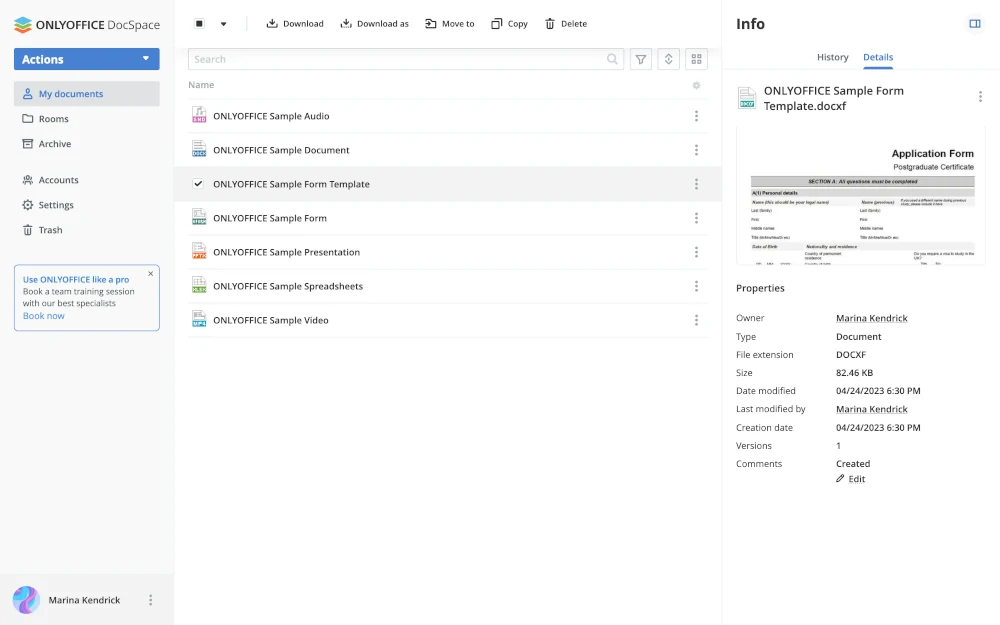
Following the recent enterprise software trend, ONLYOFFICE DocSpace offers an AI assistant whose main role is to automate text generation tasks, allowing teams and businesses to work faster and more productively.
The room-based concept of ONLYOFFICE DocSpace implies that you can create and manage rooms for better productivity, and each of the available room types has a unique purpose.
Collaboration rooms are designed for the traditional document collaboration process according to which you co-author files with other people in real time. Custom rooms work best if you need someone to review your document without editing it, comment on it, or fill out a digital form. Public rooms make it easier to interact with external users and share office files with them using links.
Using the self-hosted version of ONLYOFFICE DocSpace, enterprises can create multiple collaborative environments for teams and departments and manage them in a centralized way, and even build a cluster for better performance.
The built-in security tools and compliance with the recognized security standards make DocSpace applicable in any industry and field of business where open-source document collaboration software is needed.
2. Odoo: Multi-Purpose Business Management
Odoo is an open-source enterprise platform that features plenty of built-in modules and third-party apps, allowing big teams and companies to efficiently control and manage all their business processes.
The main distinctive feature of this software is that one platform provides almost unlimited capabilities covering various aspects of business, ranging from finance, sales, and human resources management to marketing activities and website building.
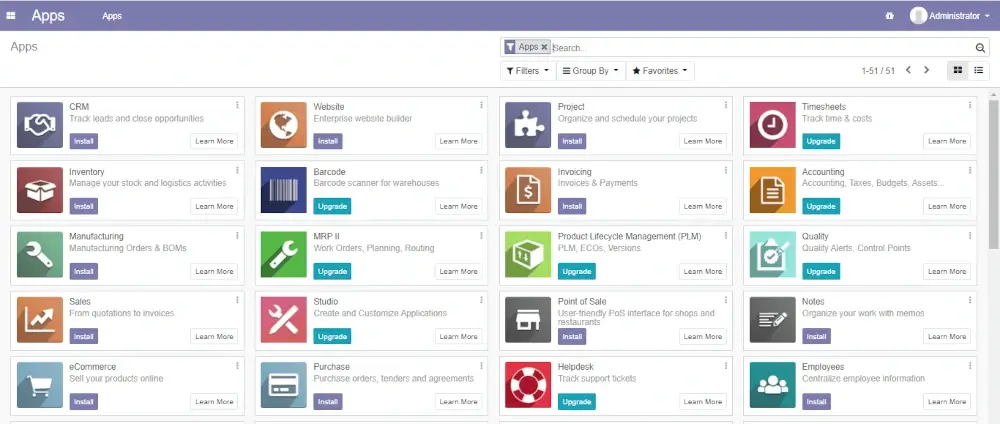
The Odoo marketplace provides access to more than 40 thousand apps developed by contributors from all over the world. Some of these apps are free, and some require a payment so any business can flexibly build its own Odoo platform according to its needs and available budget.
As an open-source software solution, Odoo gives you the freedom to own your data and the flexibility to host the platform locally in your private network.
3. Mattermost: Channel-Based Communication and Collaboration
Mattermost is an open-source collaborative platform with a focus on productivity that offers channel-based communication and structured workflow execution for technical and operational teams.
The core idea of this project is to enable enterprise-grade collaboration so that team members can effectively communicate with each other, solve problems, and automate workflows within the frameworks of a secure customizable environment.
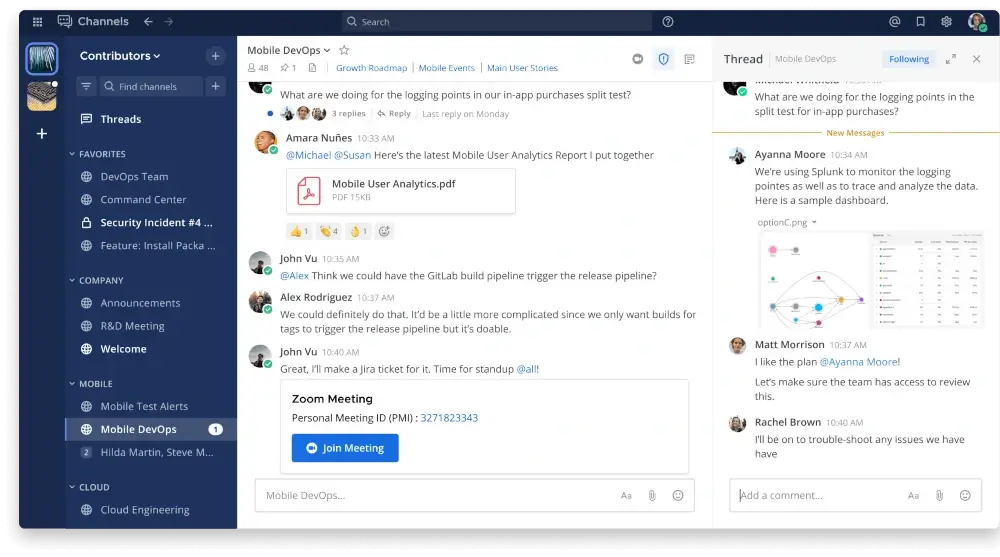
Mattermost is fully compatible with third-party applications and integrations, provides customization options, and guarantees compliance with the most popular security standards, such as HIPAA and FINRA.
With Mattermost, enterprise users can enable channel-based communication for their technical teams with an unlimited message history, share content, and connect with integrated voice and video conferencing for better productivity.
Apart from communication, Mattermost also comes with project management features allowing users to create tasks, assign responsibilities, set deadlines, and monitor project progress.
4. OpenProject: Project Management in a Secure Environment
OpenProject is a project management platform designed to guide teams through the whole project life cycle, making it easier to deliver projects on time.
It combines the classic, agile or hybrid project management approaches so any company can choose what complies with its corporate culture and values and works best for its employees.
With OpenProject, it’s possible to simultaneously work on several projects without losing productivity because you can create a clear project structure with all hierarchies and dependencies.
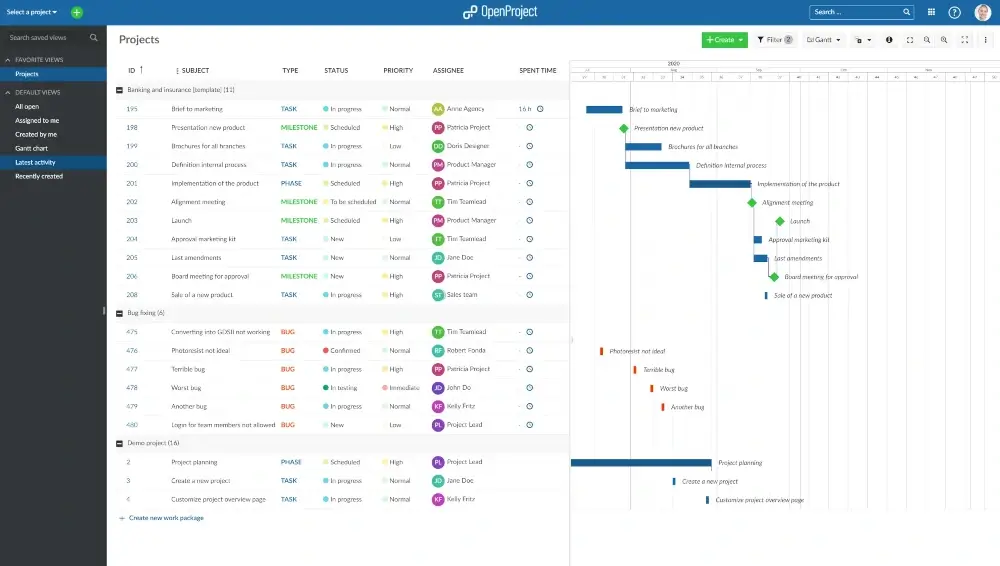
You can easily monitor the current status of all ongoing projects, set their deadlines, and visualize all important information in a single dashboard.
The platform also offers time-tracking and cost-reporting features so you can always see how much of the allocated budget has been spent on different projects and how many resources you have at your disposal.
Another advantage is the availability of communication tools. Team members can communicate in real time, share information with each other, and even manage project meetings by preparing a meeting agenda and sharing minutes with all attendees and responsible people.
OpenProject offers various integration options, like Jira, Mattermost, and Nextcloud, and a set of security tools to protect users’ data and guarantee their digital sovereignty.
5. SuiteCRM: Open-Source Customer Relationship Management
SuiteCRM is an open-source CRM (customer relationship management) application that includes multiple modules and tools for managing and automating sales processes, building relationships with clients, earning customers’ trust, monitoring various data, and accelerating business growth.
SuiteCRM helps the sales, marketing, and customer service departments of big teams and companies discover key information and provide an exceptional customer experience.
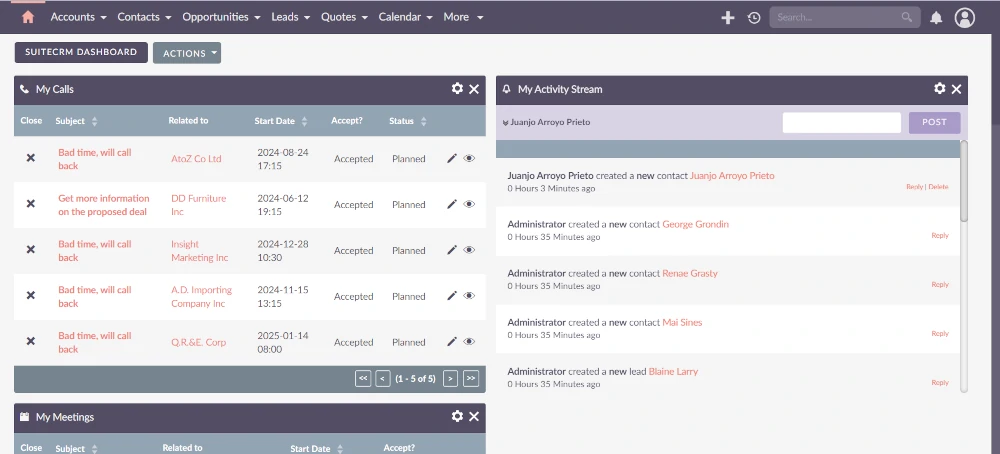
The platform has all the required features to manage interactions with current and potential customers, build databases, send personalized quotes, create engaging campaigns, generate reports, and automate key touchpoints with customers.
SuiteCRM comes equipped with special admin tools that allow you to create a custom CRM platform with the required modules and functionality adapted to your area of business.
Additionally, there are plenty of add-ons and integrations to extend the basic capabilities of the platform. For example, you can integrate DocuSign, Twilio, Zoom, Google Drive, etc.
Conclusion
The world of enterprise software doesn’t revolve around proprietary tools only. There are some decent open-source solutions that help teams and business improve their performance and grow consistently.
You can easily try such software for free and see if it makes a difference for your team and facilitates day-to-day business routine.


